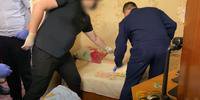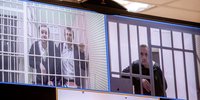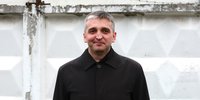The Case of Mareyev and Others in Moscow
- #
At the initiative of investigator Kristina Moskalets from the Investigation Department for the Northern Administrative District of Moscow, at least 8 searches are being carried out in different districts of Moscow and the Moscow Region.
In the Odintsovo urban district, a group of 8 law enforcement officers in masks and camouflage, one of them armed with a machine gun, invades the Tolokonnikov family at about 6:00. The security forces confiscate pension and social cards from Sergey's 74-year-old mother-in-law, who does not share his religious views. Electronic devices and personal records are also seized from believers, as well as money belonging to members of the garden association and intended to pay utility bills.
After a 7-hour search, law enforcement officers take the Tolokonnikov family to Moscow for a search in their apartment, and then for interrogation in the Investigative Committee, after which 49-year-old Sergey Tolokonnikov is detained and placed in a temporary detention facility. It becomes known that a criminal case has been initiated against him under Part 1 and Part 1.1 of Article 282.2 of the Criminal Code of the Russian Federation (organization of the activities of an extremist association and involvement of other persons in it).
A group of 8 security officials also comes to the Marunov family at about 6 am and conducts a search for 9 hours. Various editions of the Bible, personal records, and electronic devices were seized from the family, including from their son, who is not one of Jehovah's Witnesses. All three are taken to the Investigative Committee, after which Marunov's wife and son are released, and he himself is detained and placed in a temporary detention facility. A criminal case was opened against the 67-year-old believer under Part 1 of Article 282.2 of the Criminal Code of the Russian Federation.
The family of 43-year-old Roman Mareev is woken up by a group of security officers in civilian clothes at 5 am. The search in the presence of elderly parents with disabilities lasts 9 hours. During all this time, the security forces do not allow Roman to eat. Digital equipment is seized from the believer, as well as a large amount of money collected to buy a summer house. Law enforcement officers inform Roman that a criminal case has been opened against him under Part 1.1 of Article 282.2 of the Criminal Code of the Russian Federation. He is detained and placed in a temporary detention facility.
In addition to Bibles in unforbidden translations, personal records and electronic devices, the Koran, notebooks with author's verses, children's mobile phones, bookmarks and postcards are seized from other believers during searches.
The investigator officially includes Roman Mareev, Anatoly Marunov and Sergey Tolokonnikov as defendants in the criminal case.
- #
Judge of the Savyolovsky District Court of Moscow Dmitry Neudakhin chooses a measure of restraint in the form of detention against Roman Mareev and Sergey Tolokonnikov, and places Anatoly Marunov under house arrest. He is forbidden to leave the home, use means of communication, the Internet, send and receive correspondence.
Roman Mareev and Sergey Tolokonnikov are quarantined in pre-trial detention center No. 7 in Moscow at 57 Verkhnie Polya Street.
- #
- #
Roman Mareev and Sergey Tolokonnikov are transferred to pre-trial detention center No. 5 in Moscow. They are in quarantine.
- #
The lawyer visits Roman and Sergey in the Vodnik pre-trial detention center. According to him, the believers are in good emotional and physical condition. They do exercises and go to the gym. Each of them has a Bible. Roman is allowed to call his disabled mother, for whom he is very worried.
There are 12 people in the same cell with Mareev. Inmates appreciate the kindness of Roman, who "cooks soup for everyone in a ten-liter bucket." On one occasion, there were no empty seats in the cell, and a prisoner who knew Jehovah's Witnesses gave up his seat to Roman.
Mareev and Tolokonnikov are helped not to lose heart by letters from fellow believers from around the world. Roman has already received 1470 letters from 58 countries, Sergey - more than 1200.
The attitude of the cellmates and employees of the detention center towards Roman and Sergey is good. They say about them: "You are not like other criminals! What are you doing here?"
Mareev and Tolokonnikov are being held in the same detention facility together with Aleksandr Serebryakov and Yuriy Temirbulatov, who are involved in a similar case for their faith.
- #
The criminal case is submitted to the Savelovsky District Court of Moscow.
- #
In the Savyolovsky District Court, an appeal hearing on the extension of the preventive measure is being held via video conferencing with the Moscow City Court. Sergey Tolokonnikov tells the court about the overcrowding of the pre-trial detention center, where prisoners are forced to sleep in turns. The court extends the measure of restraint in the form of detention for Roman Mareev and Sergey Tolokonnikov, and for Anatoly Marunov under house arrest.
The lawyer asks to postpone the hearing on the consideration of the criminal case on the merits of the charge in order to familiarize himself with the materials and prepare for the defense. The meeting was adjourned.
- #
The lawyer visits Sergey Tolokonnikov in the pre-trial detention center. According to him, the believer "intends to endure everything to the end and not lose joy at the same time."
Sergey has a Bible. He is in an 8-bed cell, but it contains 11 people, so the order of sleep is established among the prisoners: Sergey sleeps at night, and during the day another cellmate takes his place. The believer needs to be examined by an ophthalmologist and dentist.
- #
The judge rejects the motions of the defense to return the case to the prosecutor, to exclude some evidence from the case file as unlawful and to provide a large hall for meetings or to organize an Internet broadcast of court hearings. The judge grants the request for the admission of a public defender. Now prisoners in the pre-trial detention center can be visited not only by a lawyer, but also by a public defender.
The prosecutor reads out the indictment. The defendants claim that they do not understand it and express their attitude to the charge.
- #
Before the start of the trial, the lawyer discovers that all the seats for listeners are already occupied by strangers. Soon they leave the hall, but some return. The vacant seats are occupied by friends of the defendants.
A prosecution witness is invited to the courtroom for interrogation. This person testifies in an attempt to present the defendants' religion in a bad light and slander them, but is often confused or simply reports his assumptions rather than factual data. For example, he says that he communicated with the defendants from 2009 to 2020 and states that it was unpleasant for him. However, the question of what prevented him from stopping communication, it is difficult to answer.
- #
Mareev and Tolokonnikov are transferred from pre-trial detention center No. 5 "Vodnik" to pre-trial detention center No. 4 "Bear". They do not lose heart and are grateful for the support of friends and family. They can write letters to the new address.
- #
A lawyer and a public defender visit Roman Mareev and Sergey Tolokonnikov in a pre-trial detention center. Mareev is still being quarantined, and Tolokonnikov has already been transferred to a cell. Both believers feel normal and are not discouraged. Sergey Tolokonnikov reports that he is being held in a cell with 8 smoking prisoners, so he asks the administration to transfer him to another cell and hopes for a positive solution to this issue.
- #
Believers are escorted to the court session accompanied by a dog handler and a German shepherd, which is located in the middle of a small hall. The defense raises before the court the question "whether the presence of the dog in the courtroom is an act of intimidation of the defendants and their relatives" and submits a motion for its removal, but the court does not satisfy it.
A witness who uses Article 51 of the Criminal Code of the Russian Federation is being interrogated, explaining it this way: "Jehovah's Witnesses are tried and kept behind bars here. I myself profess this religion. Therefore, I believe that any answer I have to the question about this case will be used against me." In this regard, the protocol of the interrogation of the witness is announced, which, however, does not contain any significant information about the defendants and the criminal case itself.
The prosecutor announces all 9 volumes of the criminal case, reading out only the titles, but not delving into the essence of the documents, with the exception of the conclusions of experts regarding the examinations carried out.
- #
The lawyer visits believers in SIZO-4 in Moscow.
Roman Mareev is experiencing difficulties in receiving parcels, as there are long queues in the pre-trial detention center, and parcels delivered by mail are not issued for 10 days, which is why the products in them deteriorate.
At his request, Sergey Tolokonnikov was transferred to a cell where there is not much smoking.
- #
At the hearing, the question arises about the extension of the defendants' preventive measures: Tolokonnikov and Mareev - detention, and Marunov - house arrest. After hearing the arguments of the defense, the court extends the measure of restraint for each of the defendants until March 7, 2023.
Then the prosecution witness, the husband of a female Jehovah's Witness, is interrogated. At the very beginning of the interrogation, he states that "there are good and decent people behind bars, and the criminal prosecution itself is illegal." To the questions of the prosecutor and the court, which are aimed at obtaining information of an accusatory nature against the defendants, the witness answers: "Unanswered." Then he explains: "You first explained to me the right to use Article 51 of the Constitution of the Russian Federation, I want to use it."
Answering questions from the defense, the prosecution witness reports that he suffered COVID-19 at the time of the search of his house and subsequent interrogation, which greatly affected his memory and ability to think clearly at that time. When the prosecutor reads out the record of the interrogation of this witness during the investigation, the latter acknowledges the fact that he signed each answer, but reports the following: "I did not read the protocol, they put "ticks" on me where to sign, and I blindly put signatures there. Now I regret it."
- #
The Moscow City Court is considering an appeal to extend the measure of restraint. The trip of believers from the pre-trial detention center to the court is a long journey in a stuffy, cramped and smoky paddy wagon.
The judge listens to the position of the defense and leaves the decision on the measure of restraint unchanged.
- #
The defense files a motion for the immediate release of the defendants from custody in view of the decision of the ECHR in the case of LRO Taganrog and Others v. the Russian Federation, which assesses the illegality of the liquidation of the Administrative Center of Jehovah's Witnesses in Russia. The court retires to the deliberation room and soon announces the decision to reject this petition. However, the court attaches two decisions of the ECHR in the case of "Community of Jehovah's Witnesses in Moscow" and "LRO "Taganrog", as well as the Opinion of the UN Working Group on Arbitrary Detention.
The court invites for questioning an expert religious scholar Larisa Astakhova, who performed an examination in this criminal case. The defense challenges her on the grounds of incompetence. The court dismisses the challenge. The defense then files a motion to postpone the interrogation due to the need for preparation, but the court also rejects it.
During the interrogation of Astakhova, it turns out that she had previously attended services of Jehovah's Witnesses and knew how the Bible study was conducted. She recognizes that it is important for these believers to adhere to the commandment to "love one's neighbor." Astakhova agrees that "involvement" is a legal term, so she has no right as an expert to give her assessment of the actions of the defendants. Nevertheless, Astakhova assures that the activities of the defendants are a continuation of the activities of the liquidated local religious organization, since "Jehovah's Witnesses participate in both of them."
- #
The lawyer visits Roman Mareev and Sergey Tolokonnikov in SIZO-4 in Moscow. They say that the difficulty is the long and tedious road to court, which takes from 2 to 6 hours. However, even in the most difficult circumstances, believers look for the positive. For example, they rejoice if they do not smoke in a paddy wagon on the way to court, appreciate the opportunity to see friends and relatives who come to each hearing. Sergei recalls how one of the prisoners once offered him a lollipop so that he would not get motion sickness. Mareev and Tolokonnikov receive many letters from fellow believers. Roman tells that he is written from 64 countries of the world.
- #
The defense begins to present evidence. Roman Mareev and Sergey Tolokonnikov file a petition for the study of material evidence, among them - "Holy Scripture - New World Translation".
In response to the statement that the Holy Scriptures are not the Bible, Mareev reads the "10 commandments" from the book of Exodus, as well as some famous passages from the Gospels, and explains: "Everyone knows that such words are in the Bible."
- #
Sergey Tolokonnikov was transferred to pre-trial detention center No. 3, where the conditions of detention were better than in pre-trial detention center No. 4, where there were not enough beds in the cell, it was smoky, and phone calls were not allowed.
- #
The examination of material evidence, a film about the persecution of Jehovah's Witnesses abroad at the beginning of the XX century, continues.
- #
The investigator, at the request of the court, presents 5 Bibles seized during searches in this criminal case. Sergey Tolokonnikov takes the Bible in the Synodal translation, generally accepted in Russia, and shows that it uses the name of God Jehovah.
The defence refers to the provision of Article 3.1. Federal Law "On Countering Extremist Activity", according to which "the Bible, Koran, Tanakh and Gandzhur, their content and quotations from them cannot be recognized as extremist materials." In this regard, the lawyer states: "The use of the name Jehovah in audio recordings of Tolokonnikov's conversations with an FSB agent also cannot testify to any extremist activity." Judge Dmitry Zozulya attaches the Synodal translation of the Bible to the case file as evidence.
The court listens to an audio recording of Tolokonnikov's communication with an FSB agent, after which the defendant draws attention to significant contradictions between the agent's words on the recording of the conversation and his testimony in court.
- #
The Moscow City Court is holding a hearing on appeal against the extension of custody. All three believers have their preventive measure extended.
Anatoly Marunov points out the absurdity of the situation in his case: because of house arrest, he is not allowed to walk recommended by doctors, but the believer is allowed to get to court hearings on his own.
Sergey Tolokonnikov reports that during the 18 months of his detention he changed 4 pre-trial detention centers.
- #
Anatoly Marunov testifies. As part of the presentation of evidence, the defense attaches to the case file documents on the state of health of the defendants and their close relatives. One of the lawyers petitions for the exclusion from the list of evidence of the conclusion of the psychological and linguistic examination. The court rejects the petition.
The debate of the parties is postponed to July 11. Anatoly Marunov is given permission to visit a doctor to remove stitches after a recent operation.
A large number of friends come to support the believers. 14 people are allowed into the courtroom, the rest are waiting outside and in the corridor of the court. They greet those arrested with applause.
- #
6.5 years in a general regime colony for Anatoliy Marunov and 6 years each for Roman Mareev and Sergey Tolokonnikov with deprivation of the right to engage in activities related to participation in the work of religious organizations for a period of 5 years, with restriction of freedom for a period of 1 year - this is the punishment the prosecutor requests for believers.
Believers deliver the last word.
The last word of the defendant Roman Mareev in Moscow The last word of the defendant Sergey Tolokonnikov in Moscow The last word of the defendant Anatoly Marunov in Moscow - #
- #
It becomes known that Anatoly Marunov was transferred to pre-trial detention center No. 4 "Bear" in Moscow. He can write letters.
- #
Anatoliy Marunov is taken to the pre-trial detention center in the city of Syzran. The road from Moscow takes 5 days. On the way, due to the heat, lack of ventilation and a large number of people, he practically could not sleep. It was possible to get boiling water and use the toilet only on a strict schedule.
- #
Anatoliy Marunov does not have a personal copy of the Bible, he was taken away upon admission to the pre-trial detention center. However, he hopes that after being quarantined and transferred to a common cell, he will be able to get a Bible in the library.
Anatoly delivers correspondence. In general, during the 2 months of his imprisonment, he has already received more than 300 letters, for which he is very grateful.
- #
Sergey Tolokonnikov is being held in a special unit of Moscow's pre-trial detention center No. 3. Three other prisoners are in his cell with him. On the door hangs a photograph of Tolokonnikov with a text about the "extremist inclination" of the believer. Every day, the doctor makes a round of the prisoners, and the authorities of the pre-trial detention center come in every other day.
During walks, Tolokonnikov has the opportunity to play table tennis.
- #
Roman Mareev is in Moscow's pre-trial detention center No. 4. The believer is not discouraged. When there is an opportunity, he goes in for sports. His cellmates treat him to dishes from the restaurant of the pre-trial detention center.
- #
It becomes known that Sergey Tolokonnikov was transferred to Nizhny Novgorod, pre-trial detention center No. 1.
- #
The Moscow City Court is considering the appeal of Marunov, Mareev and Tolokonnikov against the verdict of the first instance. The defense filed several motions, including that the case be returned to the prosecutor and that the Bible be examined from the case file. Believers participate in the hearing remotely while in the pre-trial detention center. Sergey Tolokonnikov, due to the poor quality of communication, has a poor understanding of what is happening in the courtroom.
The court adjourns the hearing for additional examination of the case materials.
About 30 people come to support the believers.
- #
- #
- #
Anatoly Marunov is in the process of transferring.
- #
Anatoly Marunov is in colony No. 1 in the Tambov region. He can receive letters.
- #
Anatoliy is in penal colony No. 3 in the Tambov region. Here he will serve the main term of his sentence.
- #
Sergey Tolokonnikov is in penal colony No. 2 in the Vladimir region.
- #
Anatoly Marunov is in dire need of qualified medical care, as his illness has worsened. He has already been to two hospitals. Other prisoners and the administration of the colony treat Anatoliy with respect.
- #
There are 50 people in the detachment where Sergei Tolokonnikov is. It has everything you need. He sought medical help due to high blood pressure and other health problems. Sergey has peaceful relations with other prisoners. A short meeting with his wife took place.
- #
Anatoliy is lying in a hospital room of the colony. Stress took a toll on his physical condition, he lost a lot of weight. He has been diagnosed with arrhythmia and other heart problems, but the necessary medications are available.
- #
Sergey had another short meeting with his wife. For more than a month, the believer has not received a letter.
- #
Anatoly Marunov's health is deteriorating rapidly - he has had a high fever since Thursday. According to him, on Friday it was above 39 degrees, it was difficult for him to breathe. On Saturday, the believer was visited by a paramedic, and later an ambulance was called, but Marunov was not hospitalized and his condition did not improve. According to recent reports, the man is unable to get up, and other prisoners carried him on a stretcher for examination by the colony doctor. They also helped the believer inform his wife about what was happening: they brought him to the phone and held him while he told her about his condition.
- #
Anatoly Marunov underwent a course of IVs, thanks to which he feels better. However, he is still very weak, it is difficult for him to stand and sit. An additional medical examination is pending.




